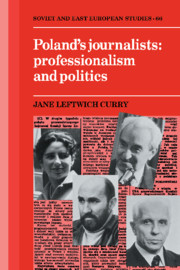Book contents
- Frontmatter
- Contents
- Acknowledgments
- 1 Journalists as professionals in theory and reality
- 2 The postwar roots of the profession
- 3 Living and learning journalism
- 4 Professional associations and professional politics
- 5 Journalists as political actors
- 6 Solidarity and beyond: the critical test of professionals and professionality
- Appendix: Research methodology: unwritten answers
- Notes
- Select bibliography
- Index
- Soviet and East European Studies
3 - Living and learning journalism
Published online by Cambridge University Press: 30 September 2009
- Frontmatter
- Contents
- Acknowledgments
- 1 Journalists as professionals in theory and reality
- 2 The postwar roots of the profession
- 3 Living and learning journalism
- 4 Professional associations and professional politics
- 5 Journalists as political actors
- 6 Solidarity and beyond: the critical test of professionals and professionality
- Appendix: Research methodology: unwritten answers
- Notes
- Select bibliography
- Index
- Soviet and East European Studies
Summary
The world of Polish journalists is a world of conflict. They learn to be professionals, to judge their own work, and to cherish their specialness as a profession, from their training and experiences as working journalists dealing with the demands and pressures of fellow staff members and readers, from the directions they receive from the Party and government elite, and also from those who edit and publish the media. None of these demands, pressures, or directions are the same nor do the practical constraints of production – deadlines, space restrictions, and resource limits – allow journalists even to come near fulfilling outside expectations. So, journalists are caught, as professionals in bureaucratic structures, in a web of constraints they cannot possibly fulfill. It is these impossible cross pressures that create in journalists a sense that they are professionals.
Like other professionals in bureaucratic settings, journalists live in two worlds. They must be responsive to and loyal to the nonprofessionals who run and fund the hierarchies where they work, even though journalists know they were hired and are needed for their special knowledge and skills. On the other hand, their values are explicitly their own. And, although they recognize that they have to work in a bureaucratic and political context, journalists resent interference. They struggle to create a work and professional world where they do not have to deal directly with the outside – however much they accept the reality of its interference.
- Type
- Chapter
- Information
- Poland's JournalistsProfessionalism and Politics, pp. 73 - 116Publisher: Cambridge University PressPrint publication year: 1990



